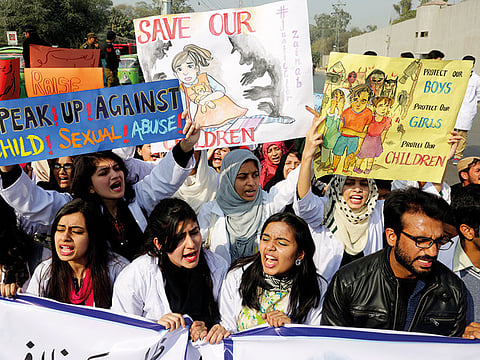Break the taboo: Pakistanis urge people to speak up on child sexual abuse after Zainab’s tragedy
As many as 11 cases of child sexual abuse are reported from across Pakistan every day

Islamabad: After eight-year-old Zainab Ansari’s chilling rape and murder case, Pakistanis are finally speaking up on child sexual abuse, breaking the taboo and traditional silence.
“Talk about sexual abuse and break the taboo,” celebrities, activists and student chanted at a protest held in solidarity with Zainab’s parents at Karachi Press Club on Thursday. The protesters demanded people to break the silence on child abuse, protection for children through education and strict implementation of law.
“We must break the communication barrier between parents and children in Pakistani families” insisted Pakistani musician and philanthropist Shehzad Roy, urging parents to take children into confidence. “Around 90 per cent of the child sexual abuse victims know the perpetrator”, which makes it significant for parents to educate the children. He added: “Most of the cases go unreported as there is no awareness on the laws for child protection.”
Pakistani actress Mahira Khan stressed the importance of creating awareness about abuse and the need to change the curriculum at school. “Schools can play a vital role in educating children in a society where sex is traditionally a taboo subject.” She added: “We have to talk about abuse and not associate it with shame. We need to tell our children not to remain silent.”
Pakistani filmmaker and activist Sharmeen Obaid-Chinoy highlighted the need to change the mindset. “Child sexual abuse should be discussed in media, films and dramas to induce a change in the attitude of people” and to help society fight the issue of child abuse.
In 2016, a Pakistani drama Udaari (Flight) was called pivotal in bringing the issue of child abuse to light. The soap opera, aired on entertainment channel Hum TV narrated the story of a young girl sexually abused by her stepfather and sparked a debate on child abuse in Pakistani society.
The rape and murder of Zainab, which has shocked Pakistan, is just the tip of the iceberg. As many as 11 cases of child sexual abuse are reported from across Pakistan every day, according to data by child protection organisation Sahil. But it is extremely rare for children or families of the abused children to report or disclose the abuse out of shame.
This is why the Pakistani activists are ardent about bringing the child abuse conversation into the homes and classrooms.
“Child abuse cannot be eliminated through punishment alone. It is a sickness and education is the only cure,” said Salma Khan, a high-school teacher in Islamabad, while talking to Gulf News. “Instead of talking on social media, I will discuss the child abuse with my colleagues and educate the schoolchildren, at least in my class.”
Sexual abuse education especially in primary schools and homes may help kids report offenders and save them from trauma, experts suggest. “Sex education must be made compulsory by law. We must educate kids about good/bad touch, encourage them to report abuse rather than fear or be shamed. Let Zainab, in death, be a catalyst for binning our cultural taboos and move forward to protect our children,” said Dan Qayyum, an activist.
However, some activists highlight that strict laws are more important than education. “If Zainab knew about sex education, would she had not been kidnapped, raped and murdered? It’s not the failure of parents but a total failure of the state and rule of law,” said blogger Farah Adeed.
Pakistanis are urging people to break the taboo and talk about child abuse to protect the kids. Because if we don’t, “we’re all facilitators of child abuse through our collective silence preferring a misplaced sense of homer over justice empowering abusers and weakening survivors”, said Jibran Nasir, activist and lawyer.
Sign up for the Daily Briefing
Get the latest news and updates straight to your inbox



